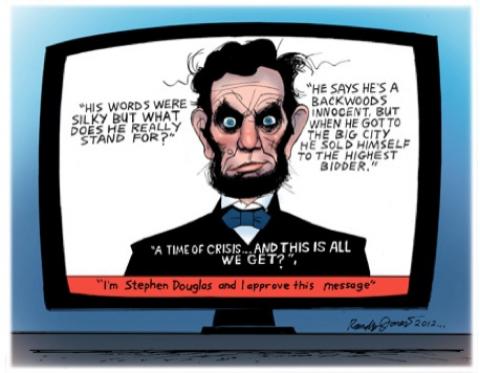- Infographic: Who's Watching Political Ads, and Are They Finishing Them? - Carrie Cummings (Adweek)
- How the Shows You Watch Determine Which Candidates’ Ads You See - Philip Bump (Washington Post)
- Corbyn: Labour Must Use Social Media to Fight Rightwing Press Attacks - Rowena Mason (Guardian)
- Want to Follow the Money Behind Political Ads? Good Luck Finding It - David Zurawik (Baltimore Sun)
- Inside Democratic Facebook’s Vicious Civil War - Caitlin Dewey (Washington Post)
Infographic: Who's Watching Political Ads, and Are They Finishing Them?
By Carrie Cummings
May 2, 2016
Adweek
As primary season reaches a fever pitch, campaigns want to get the best bang for their advertising buck. Digital ad company Conversant took a look at online video completion rates (VCR) along party lines, and delved even further into each candidate. "Granular viewership attributes are essential to political advertisers looking to maximize the impact of their ad spend, especially given the volatility of this year's campaign," said Conversant president Ric Elert. "These attributes can be used by advertisers to refine their video campaigns to ensure they are delivering coherent messaging against the most relevant and engaged audience. In addition to that approach, these attributes can also be used to influence the conversation. For example, a political group might want to run a campaign focused on specific content from the opposition."
How the Shows You Watch Determine Which Candidates’ Ads You See
By Philip Bump
May 2, 2016
Washington Post
We took data for 51 of the shows with the most 2016 advertising and made a tool that lets you compare which shows you watch with the campaigns most likely to focus their ad spending on those programs. This isn't a terribly refined calculation; we make no promise that we can tell you your party registration or anything like that. What it will tell you is, given only these shows, which candidates would be most likely to run spots that you'd see.
Corbyn: Labour Must Use Social Media to Fight Rightwing Press Attacks
By Rowena Mason
May 3, 2016
Guardian
Jeremy Corbyn has told grassroots supporters that it was necessary for Labour to use social media to communicate with the public because rightwing media were censoring political debate in an unprecedented assault on the party.
“We have a party under attack from much of the media in this country like it has never been under attack before. How do we reach out to people? We reach out because we come together at events like this. We reach out through social media in a massive way. And so I find that social media has a very important role to play in this. It is a way of reaching past the censorship of the rightwing media in this country that has so constrained political debate for so long."
Want to Follow the Money Behind Political Ads? Good Luck Finding It
By David Zurawik
April 29, 2016
Baltimore Sun
I was not alone in finding it difficult to get information about ads appearing on Comcast. Libby Watson, a staff writer at Sunlight, reported a similar experience dealing with the company's D.C. operation in an article titled "What happens when you try to discover who's behind dark money ads."
After being misdirected to a locked office and a Comcast retail outlet, Watson finally found a site behind an Enterprise car rental outlet. A Comcast worker let her in another locked door and searched out PDF information for her on a group called Protect America's Consumers. Since there was no printer, Watson had to take photos of the screen with her smartphone or rely on notes.
"My interest in this group was sparked in the same way it would be for many average citizens," she wrote. "Watching TV, I saw an ad for a group that I hadn't heard of and wondered what the deal was. But thanks to the utterly arcane disclosure policies still in place, I had to take a morning and a Metro to find out even basic details about the ad buy — and I still have no idea who's truly behind this group."
Inside Democratic Facebook’s Vicious Civil War
By Caitlin Dewey
May 5, 2016
Washington Post
According to popular theory, which has been repeated so often in copy-paste memes that it’s widely treated as truth, the Clinton campaign has armed hundreds of professional Internet trolls with the goal of sabotaging Sanders’ Facebook groups. They sneak into closed communities with fake names and profiles, the rumors say, then post wild rants to make Sanders’ supporters look bad. Or they file thousands of fake abuse reports to Facebook, until the groups are overrun and their pages go black.
In pro-Hillary groups, meanwhile, Clinton supporters make much the same claims about trolling, spamming, even coordinated harassment campaigns. In fact, among a certain hyper-dedicated class of Democratic voter, there’s a widespread conviction that they’re engaged in an all-out social media war – a war that’s grown so paranoid, and so illogical, that in late April, two people’s lives were unceremoniously upended over what turned out to be a Facebook database error.


Spread the word